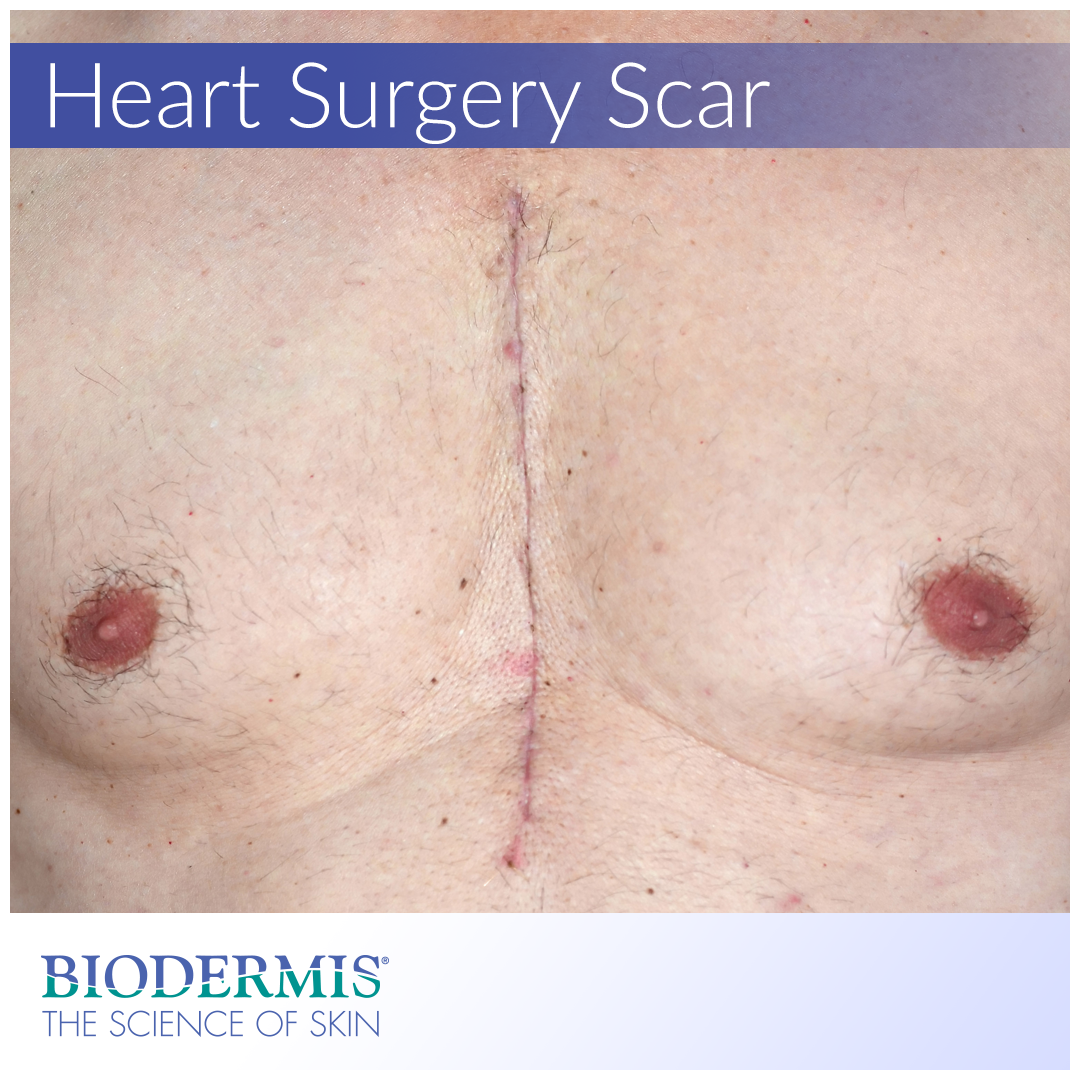Open heart surgery, also known as cardiac or cardiovascular surgery, is a major invasive procedure that requires a surgeon to open the rib cage and operate on the heart. Numerous complications with the muscles, valves, and arteries of the heart can be corrected with open heart surgery. People with coronary heart disease or congenital heart disease, in addition to heart attack victims, are potential candidates for this procedure. Any kind of injury or trauma to the heart, if serious enough, may also require open heart surgery.
Notwithstanding modern medicine, post-operative care and recovery often present big challenges for some patients. One aspect of heart surgery recovery that receives little attention is the cosmetic appearance of a patient’s scar. If you are predisposed to keloid or hypertrophic scarring, continue reading to learn what you can do to promote fast recovery and prevent nasty scars.
Treating your scar
Traditional heart surgeries left patients with scars over the sternum measuring 6 to 8 inches in length. These scars were unsightly and painful, and would often lead to keloid or hypertrophic scar formations. Fortunately, with modern advances in medicine and technology, minimally invasive procedures are much more common. It’s possible for a heart surgery patient today to leave the operating table with a scar 2 to 4 inches in length. Minimally invasive surgeries reduce scarring and the risk of infections, and usually lead to quicker recoveries.
Patients may experience different recovery rates after an open heart surgery, but as a general rule, one's health will stabilize after 8 to 12 weeks. If you want the best results for your scar during this recovery period, follow the four tips listed below.
Patients may experience different recovery rates after an open heart surgery, but as a general rule, one's health will stabilize after 8 to 12 weeks. If you want the best results for your scar during this recovery period, follow the four tips listed below.
- Avoid strenuous exercise and activities – The reopening of your incision after surgery can complicate the wound-healing process dramatically. Avoid lifting objects more than ten pounds and refrain from any intense labor that might reopen your wound.
- Protect against direct sunlight – Immature scars don’t react well to direct sunlight. Extended exposure to ultraviolet radiation can contribute to hyperpigmentation, resulting in discolored scar tissue.
- Clean your incision – Use lukewarm water and a mild soap or cleanser like SilqueClenz to wash your incision site. Maintaining a clean wound will minimize dirt and germs, preventing irritation or infection.
- Use silicone gel sheeting – Silicone gel sheeting and silicone gel ointments have been used as an effective scar therapy solution for over 30 years. Ask your doctor if medical silicone is right for you, and visit Biodermis.com today for a complete range of scar care products.
For optimal recovery results after open heart surgery, it’s important to follow any instructions given by your surgeon in addition to these steps.
What will my scar look like after heart surgery?
The size of your scar after open heart surgery will largely depend on the specific procedure performed and the decision made by your surgeon. The way your body produces scars is largely determined by your genetics, skin type, and how well you maintain your scar. Given these factors, it’s difficult to predict how an individual’s scar will look after an invasive procedure. Many scars fade over time, but some don’t. It’s also important to know that a scar will never entirely diminish, even with the help of modern medicine.
Luckily, there are many topical solutions for scars that will flatten them and reduce their appearance. In the best case scenario, and with the right products, you can help your scar blend in with the surrounding tissue, making it less noticeable.
Luckily, there are many topical solutions for scars that will flatten them and reduce their appearance. In the best case scenario, and with the right products, you can help your scar blend in with the surrounding tissue, making it less noticeable.
Clinically-proven treatment for all scar types
Scar care products can be found everywhere online and in stores. But many of these products contain ingredients that aren’t supported by clinical evidence and can even be harmful to your skin. Knowing which products to purchase and which to avoid is vital for improving the appearance of your scar.
Vitamin E found in many scar gels and ointments has no proven benefits for reducing the appearance of scars. In fact, in one study conducted by doctors Bauman and Spencer, vitamin E was shown to have no effect on the appearance of patients’ scars. In some cases, patients contracted contact dermatitis from vitamin E exposure and the appearance of their scars worsened. Onion extract found in Mederma has similarly poor results, and there is yet to be any conclusive evidence for its use as a scar treatment.
Silicone gel sheeting has been on the market for over 30 years, and numerous clinical studies support its efficacy as a prominent scar therapy solution. Through the mechanisms of hydration and collagen regulation, silicone sheeting is able to soften and flatten old and new scars. But not all gel sheets are made equal, and it’s important to do your research before buying. Silicone sheets found in the store only measure about 1 to 2 inches in length, so you would need multiple sheets to cover the size of your open heart surgery scar. Store-bought silicone gel sheets are flimsy and ineffective, and they aren’t meant for larger scars.
Biodermis emerged 30 years ago as a trusted leader in post-operative care and scar management. For scars 4 to 6 inches in length resulting from open heart surgery, Epi-Derm C-Strips are the perfect solution. Scars 7 to 11 inches in length can be effectively managed with Epiderm Long Strips. Silicone gel sheets can be cut to fit your scar size and reused for up to two weeks. As an alternative to traditional gel sheeting, Pro-Sil silicone scar sticks represent a unique and convenient treatment option for small and medium-size scars.
Biodermis is an innovative market leader with 30 years of expertise in the medical silicone industry. Visit Biodermis.com today to explore a complete range of scar management and post-operative care solutions.
PHYSICIANS AND MEDICAL PROFESSIONALS: REFER OR RESELL? Biodermis offers custom tailored referral programs designed to simplify and reduce the cost of your patients' post-op care. Additionally, we offer professional pricing if you opt to retail our products. Give us a call at 800.322.3729, and we will be happy to provide additional details on these programs.




